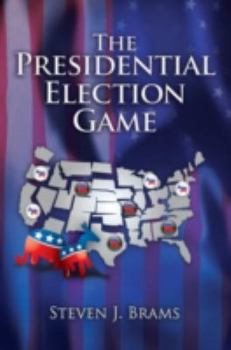The Presidential Election Game
Select Format
Select Condition 
Book Overview
The Presidential Election Game may change the way you think about presidential elections and, for that matter, American politics in general. It is not filled with statistics about the voting behavior... This description may be from another edition of this product.
Format:Paperback
Language:English
ISBN:1568813481
ISBN13:9781568813486
Release Date:November 2007
Publisher:A K PETERS
Length:218 Pages
Weight:0.74 lbs.
Customer Reviews
1 rating
Informative, but no beach read
Published by Thriftbooks.com User , 16 years ago
As of the writing of this review, the 2008 presidential election is shaping up to be quite interesting. No matter who you support - McCain, Obama or Clinton - it is kind of fun from a political junkie point of view. Of particular interest is the Obama-Clinton rivalry for the nomination; it has been a long time since a party convention had more meaning than a mere rah-rah coronation. If you're a fan of these things - and despite my definite leanings towards one of the three, I am - it is nice to get additional insights into the election process. Steven J. Brams's The Presidential Election Game offers a mathematical look at the run for the highest office. Originally published in 1978, it doesn't provide much direct insight into recent elections (outside of some comments in a new Introduction), but there is still a lot of good material here, presented in a nonpartisan manner. The book is divided into six chapters. The first deals with the nomination process and how candidates should stake themselves to particular positions. At time, it is best to take the "moderate" position, but other times, it is better to move right or left. It depends on how many opponents there are and where they are on the political spectrum. The second chapter deals with the voting processes in a convention. This might be the most irrelevant chapter because - Obama-Clinton aside - the conventions rarely decide candidates anymore. The third chapter describes strategies in the general election and the best allocation of resources to get the most electoral votes. Does the electoral process favor big or small states? Baum gives some perspective. The fourth chapter deals with the building of coalitions when an outright majority is impossible and offers the idea that one party falls apart (such as the Federalists in 1816), the other party may enjoy temporary power but fragmentation is inevitable. The fifth chapter gets into the game theory behind the Supreme Court's ruling against Nixon, and how a unanimous ruling helped avert a Constitutional crisis. The final chapter is Baum's proposition for an alternate form of holding an election: in approval voting, a person can either vote for one candidate or against another; the highest net of pluses versus minuses is the winner. Though the topics are compelling, the writing is very dry, and even at 160 pages (and only high-school level math), this is no beach read. There are also a couple errors, such as when Baum states that Clinton never went on trial in the Senate. The Presidential Election Game may be informative, but it is mostly for the true fan of the political process.





